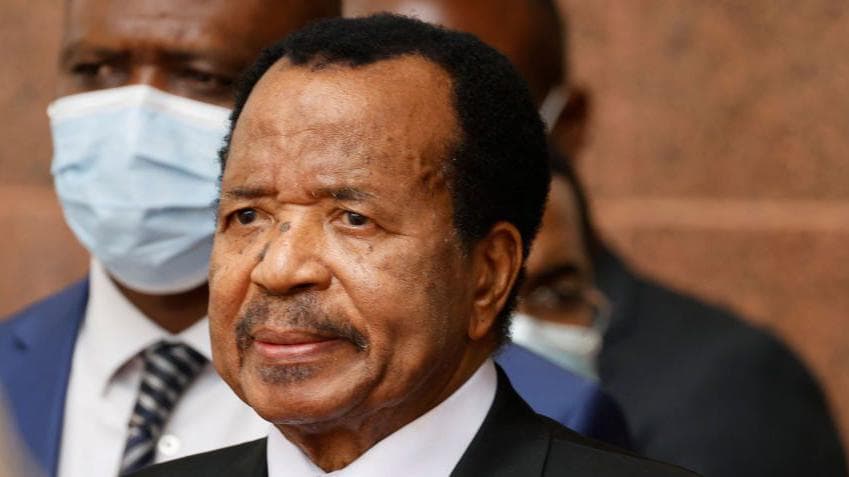We're loading the full news article for you. This includes the article content, images, author information, and related articles.
As Cameroon's 92-year-old President Paul Biya campaigns for an eighth consecutive term in the upcoming Sunday, October 12, 2025, presidential election, he faces a growing wave of frustration from a youthful population yearning for change and economic opportunities.

Cameroon's President Paul Biya, at 92, is seeking to extend his 43-year rule by running for an eighth consecutive term in the presidential election scheduled for Sunday, October 12, 2025. His campaign, marked by a singular rally and a private trip to Europe, has drawn criticism, particularly from a young electorate that has known no other leader. Biya, who has been in power since 1982, has promised that "the best is still to come" for Cameroon.
However, this promise resonates differently with a significant portion of Cameroon's population, where the median age is 18. Many young Cameroonians express disillusionment with the political system and a lack of faith in the electoral process, citing high unemployment and corruption as major concerns.
Paul Biya ascended to the presidency on November 6, 1982, following the unexpected resignation of then-President Ahmadou Ahidjo. He has since maintained a firm grip on power, a tenure marked by the abolition of presidential term limits in 2008, which paved the way for his continued re-elections. His rule has been described by some analysts as having hollowed out democratic institutions and stifled dissent.
The upcoming election sees Biya challenged by nine opposition candidates. However, the opposition remains fragmented, and a notable challenger, Maurice Kamto, who was the runner-up in the 2018 election, has been disqualified from the 2025 race due to alleged non-compliance with legal requirements.
Cameroon's electoral system operates on a first-past-the-post basis, meaning the candidate with the most votes wins without needing an absolute majority. The registration for voting for the 2025 election concluded on August 31, 2024, with over seven million people estimated to have registered. Despite this, concerns about the credibility of past elections and allegations of electoral fraud persist.
The government has faced scrutiny for extending the terms of municipal councillors and members of the National Assembly, a move critics argue violates constitutional provisions for such actions only during a serious crisis.
The sentiment among many young Cameroonians is one of weariness with the prolonged leadership. Elvis Nghobo, a 34-year-old food vendor in Yaoundé, exemplifies this frustration, blaming a corrupt education system for his inability to secure professional opportunities and expressing a lack of motivation to vote. Conversely, a surge in youth voter registration has been observed across all ten regions, with many young people actively collecting their voter cards and expressing a desire to influence the nation's future. Social media campaigns using hashtags like #MyVoteCounts and #Change2025 reflect this renewed engagement.
The continued rule of an aging leader in a country with a predominantly young population presents potential risks, including sustained youth frustration and a widening disconnect between the government and its citizens. The disqualification of key opposition figures and allegations of electoral manipulation could further erode public trust in democratic processes. Furthermore, Cameroon faces ongoing security challenges, including a secessionist movement in its western Anglophone regions and the persistent threat of Boko Haram in the north.
Despite the visible enthusiasm among some young voters, it remains uncertain whether this will translate into a significantly higher voter turnout compared to previous elections. The impact of the opposition's inability to form a united front against President Biya also remains a key unknown. The long-term implications of Biya's extended rule on Cameroon's democratic development and economic stability are subjects of ongoing debate.
The presidential election is set for Sunday, October 12, 2025. Candidates were required to submit their applications by July 21, 2025. The official campaign period is underway, with candidates making their final appeals to voters.
Observers will be closely watching the voter turnout, particularly among the youth, to gauge the extent of their political engagement. The transparency and fairness of the electoral process, especially in light of past allegations, will also be under scrutiny. The post-election period will reveal how the government addresses the concerns of its young population and navigates the country's various socio-economic and security challenges.
For further insights into Cameroon's political landscape, explore reports on youth unemployment, the Anglophone crisis, and the history of presidential elections in the country.
Keep the conversation in one place—threads here stay linked to the story and in the forums.
Sign in to start a discussion
Start a conversation about this story and keep it linked here.
Other hot threads
E-sports and Gaming Community in Kenya
Active 9 months ago
The Role of Technology in Modern Agriculture (AgriTech)
Active 9 months ago
Popular Recreational Activities Across Counties
Active 9 months ago
Investing in Youth Sports Development Programs
Active 9 months ago
Key figures and persons of interest featured in this article